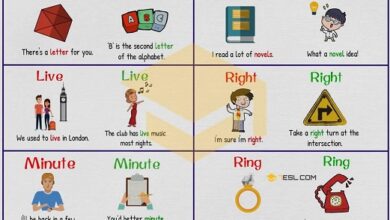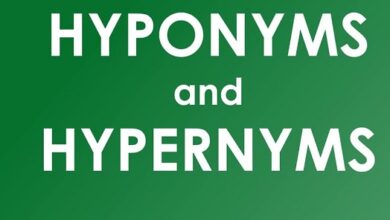Homographs examples with definition and Subdivision
Definition of homograph and examples in English
According to the Macmillan Dictionary , a homograph is each of two or more words that are spelled identically but are different in meaning and sometimes in pronunciation. An example of a well-known English homograph is Dove . This word has two pronunciations and, according to its pronunciation, its meaning changes. In this article we will make you aware about the examples of homographs.
Dove , pronounced /dav/, means dove
Dove , pronounced /douv/, is the past tense of the verb dive .
Homograph – Subdivision
English grammar generally subdivides homographs into three groups. Let’s see.
Homograph – Group 1
Homographs that have the same spelling and pronunciation , but different meanings and/or origin. Examples:
Bear (S): bear
Bear (V): carry
Date (S): date (type of fruit); day in calendar, boyfriend
Date (V): dating; go out for a date
Hide (S): fur, animal
hide Hide (V): hide
Net (S): net made of rope
Net (Adj): net, as in net weight
Pick (S): pick (tool)
Pick (V): pick
Fast (Adj): fast
Fast (V): abstain from food
Homograph – Group 2
Homographs that have the same spelling but different stressed syllables . By changing the stressed syllable, we transform the homograph into a noun or verb. Examples:
Address
áddress (N): address address
(V): write an address; give a lecture, give a speech.
Compress
cómpress (N): compress placed on the skin.
compress (V): compress.
Export
éxport (N): something that is exported.
expórt (V): send a product out of the country to be sold.
Insult
insult (N): insult, insult insult
(V): to say or do something that is offensive or rude.
Convert
convert (N): converted; neophyte.
convert (V): change from one form to another.
Desert desert
(N): desert desert
(V): to desert, forsaken
Homograph – Group 3
There are also homographs with the same spelling , but with different pronunciations and meanings . Examples:
Read pronounced /ríyd/: to read, in the present tense.
Read pronounced /red/: read, in the past tense.
Pronounced lead /líyd/: to lead, to lead.
Pronounced lead /led/: lead.
From pronounced /dóu/: music note do.
From the pronounced /dúw/: to do.
Bow pronounced /bau/: bow, bow
Bow pronounced /bou/: bow (used with arrows)
We hope that you have understood the examples of homographs.



